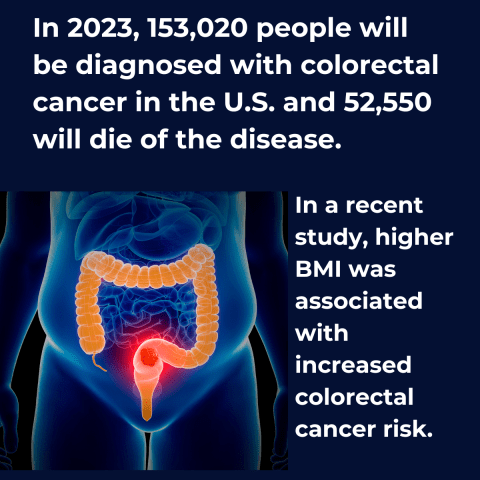Date Posted, by DCP Staff
Scientists consider the role of overweight and obesity in increasing the risk for gastrointestinal cancers to be well established, with colorectal cancers the most common of these malignancies in the United States. According to National Cancer Institute (NCI) data, an estimated 153,020 men and women in the U.S. will be diagnosed with colorectal cancer in 2023, and 52,550 are expected to die of this disease. In two recent studies, researchers addressed the impact of overweight, obesity, and body mass index (BMI) on colorectal and non-colorectal gastrointestinal (GI) cancers at different stages of adult life, as well as the association of BMI and different molecular subtypes in colorectal cancers.
Obesity, BMI, and Cancer Across the Lifespan
In a new retrospective cohort study, researchers found that being overweight or obese in early and middle adulthood increases the risk for developing colorectal and non-colorectal GI cancers throughout a person’s lifetime. Even when an individual starts out as underweight or falls within a normal BMI as a young adult, the risk rises if they later become overweight or obese, according to the research.

The study also found taking aspirin three or more times a week did little to blunt the cancer risk, a finding that appears counter to aspirin’s long supported use in cancer prevention. Because this observation may be tied to inadequate dosing, however, the researchers suggested further investigation is warranted.
To perform this secondary analysis of BMI’s impact on GI cancer risk, researchers Holli Loomans-Kropp, Ph.D., M.P.H., of The Ohio State University College of Medicine, and Asad Umar, Ph.D., D.V.M., of NCI’s Division of Cancer Prevention, relied on data from the Prostate, Lung, Colorectal, and Ovarian Cancer Screening Trial in men and women aged 55 to 74 who were enrolled and randomized to a screening group or a control group at 10 screening centers nationwide.
The analysis included data from 135,161 participants. Each of them filled out a baseline questionnaire, self-reporting weight and height at three different times in their lives: age 20, defined as early adulthood; age 50, defined as middle adulthood; and after age 55, considered later adulthood. Across these time periods, the researchers found a 2-4% increased risk for colorectal and non-colorectal GI cancers with every 1-unit rise in BMI score. Results of the study appeared online in JAMA Network Open in May.
“Such important findings highlight the unmet need to identify the critical time window linking adiposity [having too much fatty tissue] and GI cancer risk,” wrote Yin Cao, Sc.D., M.P.H., and Mengyao Shi, M.B.B.S., M.P.H., of the Washington University School of Medicine in St. Louis, in a commentary accompanying the paper. Prior to this analysis, they wrote, most epidemiology studies examined BMI at just one point in time, “missing the opportunity to delineate the contributions of adiposity throughout the life course.”
The cohort study also highlights the growing interest and unmet need for understanding the impact of childhood obesity and maternal adiposity on subsequent GI cancer risk, Drs. Cao and Shi wrote, given the rising incidence in several of these cancers, including early-onset colorectal cancer, before age 50. So far, they wrote, effective interventions have been limited beyond lifestyle changes and newer anti-obesity drugs that still carry uncertain benefits for reducing long-term cancer risk.
Many questions remain, according to Drs. Cao and Shi. To develop effective prevention strategies able to disrupt GI malignancies early in disease, they wrote, “transformative epidemiologic and mechanistic studies involving comprehensive, longitudinal characterization of obesity throughout the lifespan” are needed, along with deeper molecular profiling of malignant tumors, their precursors, and normal tissues and biospecimens.
Reference: Loomans-Kropp H, Umar A. Analysis of Body Mass Index in Early and Middle Adulthood and Estimated Risk of Gastrointestinal Cancer. JAMA Netw Open 2023; 1;6(5):e2310002.
BMI and Molecular Subtypes of Colorectal Cancer
Another study, supported in part by NCI and led by Neil Murphy, Ph.D., of the International Agency for Research on Cancer in France, suggests that obesity influences nearly all major pathways involved in colorectal cancer as it develops. The association of higher BMI with increased colorectal cancer risk was stronger for men than women, but similar across tumor subtypes defined by molecular markers.

The findings come from a large, pooled data analysis of 11 observational studies within the Genetics and Epidemiology of Colorectal Cancer Consortium and Colon Cancer Family Registry. The researchers examined data from 11,872 colorectal cancer cases and 11,013 controls.
Higher BMI was consistently associated with increased colorectal cancer risk, with little evidence of differences across molecular subtypes, in contrast to previous studies. Because these earlier studies had fewer study participants, that precluded the ability to analyze BMI’s association with five well-defined tumor marker classifications, known as Jass subtypes, according to the investigators.
As this was the largest study yet to investigate these associations, the researchers said they were able to examine the association between BMI and all five Jass subtypes, providing insight into how adiposity affects different pathways for cancer. In four of the five molecular subtypes analyzed, high BMI elevated colorectal cancer risk.
The lone exception of this association: Tumors sampled from individuals with Lynch syndrome, a hereditary condition that carries a 70-80% lifetime risk for colorectal cancer when the ability to correct genetic mistakes during DNA copying is lost. DNA mismatch repair deficiency was one of the five Jass subtypes under study.
The lack of association of BMI with Lynch syndrome-associated tumors suggests BMI may not be a risk factor for colorectal cancer in individuals with these inherited conditions, according to the researchers. They say additional studies are needed to confirm this finding and to enrich understanding of the association of BMI and these cancers. The Journal of the National Cancer Institute published the findings in February.
Reference: Murphy N, Newton CC, Song M, et al. Body Mass Index and Molecular Subtypes of Colorectal Cancer. J Natl Cancer Inst 2023; 115(2): 165–173.
If you would like to reproduce some or all of this content, see Reuse of NCI Information for guidance about copyright and permissions. Please credit the National Cancer Institute as the source and link directly to the blog post using the original title, for example: "Research Highlights: Investigating Associations of Obesity with Colorectal and GI Cancers was originally published by the National Cancer Institute." For questions, contact us at CancerPreventionBlog@mail.nih.gov.
